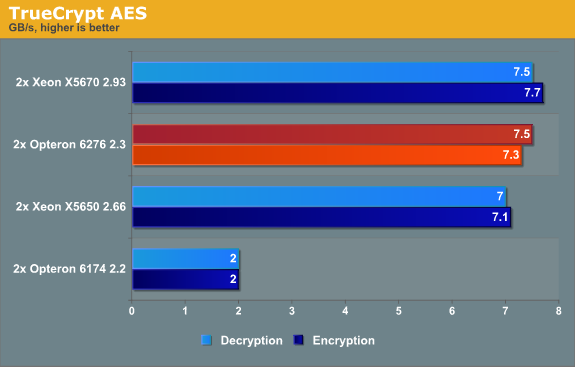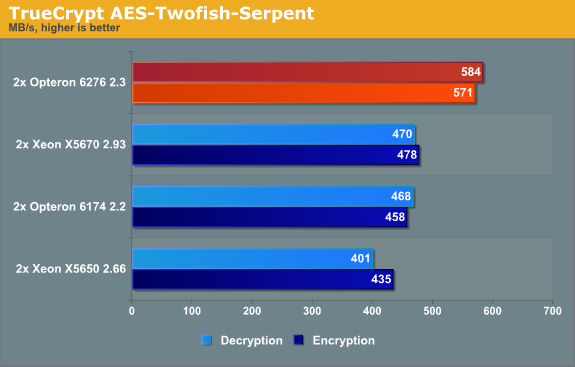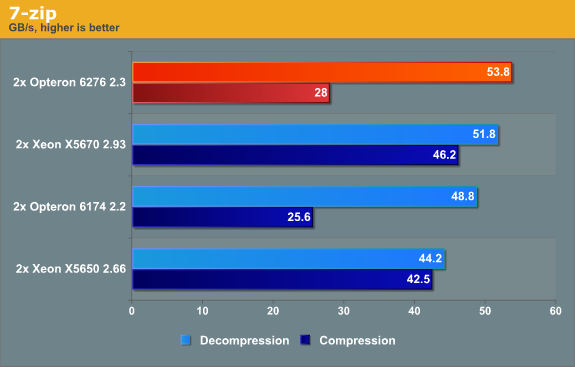Bulldozer for Servers: Testing AMD's "Interlagos" Opteron 6200 Series
by Johan De Gelas on November 15, 2011 5:09 PM ESTTrueCrypt 7.1 Benchmark
TrueCrypt is a software application used for on-the-fly encryption (OTFE). It is free, open source and offers full AES-NI support. The application also features a built-in encryption benchmark that we can use to measure CPU performance. First we test with the AES algorithm (256-bit key, symmetric).

You can compare those numbers directly with Anand's benchmark here. The Core i7-2600K at 3.4GHz delivers 3.4GB/s and the AMD FX-8150 at 3.6GHz about the same 3.3GB/s. We get about 2.3 times the performance here with four times as many "cores", but at 2.3GHz instead of 3.6GHz.
We also test with the heaviest combination of the cascaded algorithms available: Serpent-Twofish-AES.

The combination benchmark is limited by the slowest algorithms: twofish and serpent. The huge advantage that the architectures (Opteron "Bulldozer" and Xeon "Westmere") which support AES-NI had has evaporated: the Opteron 6174 keeps up with the best Xeons. The Opteron 6276 can leverage its higher threadcount as this benchmark scales extremely well.
It is good to realize that these benchmarks are not real-world but rather synthetic. It would be better to test a website that does some encrypting in the background or a fileserver with encrypted partitions. In that case the encryption software is only a small part of the total code being run. A large performance (dis)advantage might translate into a much smaller performance (dis)advantage in that real-world situation.
For example, eight times faster encryption resulted in a website with 23% higher throughput and a 40% faster encrypted file (see here). The advantage that the Xeon had in the first benchmark will not be noticeable, and the Opteron's 24% higher performance will translate into a few percentage points. But this is a benchmark where AMD's efforts to get a 16 integer cores inside a 115W TDP pay off.
7-Zip 9.2
7-zip is a file archiver with a high compression ratio. 7-Zip is open source software, and most of the source code is under the GNU LGPL license

Compression is more CPU intensive than decompression, and the latter depends a little more on memory bandwidth. When it comes to load/stores and memory bandwidth, the Opteron 6276 is unbeateable. We've also seen indications that Bulldozer's cache does very well in reads but not so well in writes, and that could account for some of the gap between the compress/decompress results.
Compression is for a part determined by the quality of the branch predictor (higher than normal branch mispredictions on mediocre branch predictors). The Opteron 6276 has a better branch predictor than the Opteron 6174, but the branch misprediction penalty has grown from 12 to 20 cycles. As a result, a single branch intensive thread runs slower (see Anand's tests) on the newest AMD architecture. Luckily, the AMD Opteron 6276 can compensate for this with its 16 threads (vs 12 threads for the Opteron 6172) and a little bit of help from Turbo Core.
Intel still has the best branch predictors in the industry. The result is that the Xeon is by far the fastest compressor. The end result is that the Xeon is the more rounded CPU in this discipline.










106 Comments
View All Comments
zappb - Tuesday, November 29, 2011 - link
Thanks Johan for the ungodly amount of time you and your team spent on this review, also thanks to all contributors to the comments which was very useful to get more context to someone like myself who is not very up to speed with server tech.The 45 Watt and 65 watt Opterons not mentioned on the front page of the article (but mentioned in the comments - are these based on Interlagos?)
To me it looks like a big win for AMD - and these benchmarks are are not even optimised for the architecture (Linux kernel 3 was not used - can't wait to see updated benchmarks, something like FreeBSD or when we get an updated scheduler for the windows server OS's...should make a big difference.
Really low idle power consumption is nice, and Im planning to pick one of these up (for home use) to play around with FreeBSD, vm's, etc...just for training purposes,
The other point about Intel's sandybridge Xeons, these are just going to be 8 core 3960x right? Which may not change the current server landscape very much depending on their prices.
JWesterby - Friday, February 10, 2012 - link
Respect is due, Johan! You did a very useful review under significant limitations. The very best part is to point an unbiased light at a damned interesting CPU. There is an important "next step," which I will address shortly.As always, just the mention of AMD brings out hysterical attacks. One would think we were talking about Stem Cell research!! There is no real discussion -- it's pitchforks, lit torches, and a stake ready for poor Johan and anyone else ready and willing to consider the mere possibility that AMD have produced worthy technology!!
Computer technology - doing it, anyway - has changed. It's become ALL about the bloody money, and the "culture" of the people doing technology has also changed -- it has become much more cut-throat, there is far less collegiality, and the number of people willing to take risks on projects has become really uncommon. Qualified people doing serious technology just because they can is uncommon.
There is no end to posers (including some on this board), Machiavellian Fortune 500 IT managers, and "Project Managers" who are clueless (there ARE some great IT managers and wonderful PM's but their numbers are shrinking). My hat to those in Open Source - they are the Last Bastion of decency for the sake of decency, and technology merely for the joy of doing it !!
"Back in the day" people seemed really into the technology, solving difficult problems, and making good things happen. There was truly a culture. For example not taking a moment to help someone on the team or otherwise made you a jerk. Development was a craft or an art, and we were all in it together. We are loosing that, and it's become more dog-eat-dog with a kind of mean spirit. What a shame. Many of the comments here are perfect examples -- people who would rather burn down the temple than give a new and challenging technology a good think.
Personally I can't wait to get my hands on a couple of AMD's new CPU's, build a decent server, and carefully work out the issues with patience. These new Opterons are like a whole new tech that may be the beginning of all new territory.
My passion and some professional work is coding at the back end in C/C++ and I'm just beginning to understand CUDA and using GPU's to beef up parallel code. My work is all around (big) data warehousing, cutting edge columnar databases, almost everything running virtual, all the way through to analytics on BI platforms. I do all of that both on MS Server 2008, Solaris and FreeBSD. All that is a perfect environment to test AMD's "new territory."
Probably worth a blog at some point because these processors are new territory and using them well will take some work just keeping track of all the small things that shake out. That's the "next step" that this and other reviews require to really understand AMD's Bulldozers. Doing that well, if AMD is right with these chips, means being able to build some great back-end servers at a much more approachable price; more importantly without paying an "Intel" tax, and in the end having two strong vendors and thereby more freedom to make the best choice for the requirement.
PhotoPrint - Sunday, December 25, 2011 - link
you should make fair comparison at the same price range!lts like comparing GTX580 VS AMD RADEON 6950!
g101 - Wednesday, January 11, 2012 - link
Wow, anad let the truth about bulldozer leak out.ppennisi - Wednesday, March 7, 2012 - link
To obtain maximum performance from my Dell R715 server equipped with dual Interlagos processor I had to DISABLE C1E in the BIOS.Under VMware the machines performance changed completely, almost doubled in performance.
Maybe you should try it.
anti_shill - Monday, April 2, 2012 - link
Here's a more accurate reflection of Bulldozer/ interlagos performance, untainted by intel ad bucks...http://www.phoronix.com/scan.php?page=article&...
But if u really want to see what the true story is, have a look at AMD's stock price lately, and their server wins. They absolutely smoke intel on virtualization, and anything that requires a lot of threads. It's not even close. That would be the reason this review pits Interlagos against an Intel processor that costs twice as much.